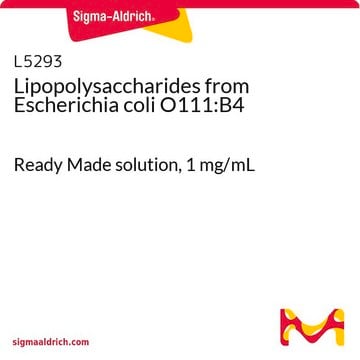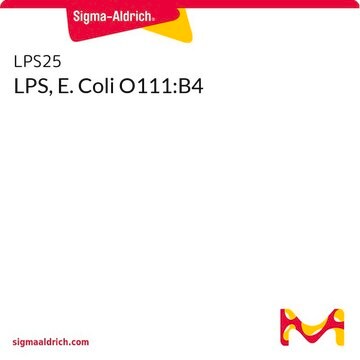L3023
Lipopolysaccharides from Escherichia coli O111:B4
Detoxified
Sinónimos:
LPS
About This Item
Productos recomendados
biological source
Escherichia coli (O111:B4)
Quality Level
form
lyophilized powder
color
white to beige
solubility
water: soluble
shipped in
ambient
storage temp.
2-8°C
¿Está buscando productos similares? Visita Guía de comparación de productos
General description
Application
Biochem/physiol Actions
Preparation Note
Other Notes
Related product
signalword
Danger
hcodes
Hazard Classifications
Acute Tox. 2 Oral
Storage Class
6.1A - Combustible acute toxic Cat. 1 and 2 / very toxic hazardous materials
wgk_germany
WGK 3
flash_point_f
Not applicable
flash_point_c
Not applicable
ppe
Eyeshields, Gloves, type N95 (US)
Certificados de análisis (COA)
Busque Certificados de análisis (COA) introduciendo el número de lote del producto. Los números de lote se encuentran en la etiqueta del producto después de las palabras «Lot» o «Batch»
¿Ya tiene este producto?
Encuentre la documentación para los productos que ha comprado recientemente en la Biblioteca de documentos.
Los clientes también vieron
Contenido relacionado
Lipopolysaccharide (LPS) is a major component of Gram-negative bacteria, important for microbiological research.
Lipopolysaccharide (LPS) is a major component of Gram-negative bacteria, important for microbiological research.
Lipopolysaccharide (LPS) is a major component of Gram-negative bacteria, important for microbiological research.
Lipopolysaccharide (LPS) is a major component of Gram-negative bacteria, important for microbiological research.
Nuestro equipo de científicos tiene experiencia en todas las áreas de investigación: Ciencias de la vida, Ciencia de los materiales, Síntesis química, Cromatografía, Analítica y muchas otras.
Póngase en contacto con el Servicio técnico



